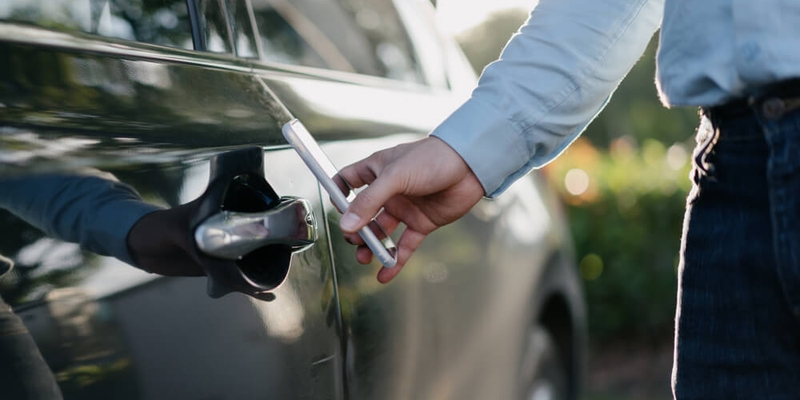
If you are not redirected within 30 seconds, please click here to continue.
Samedi: 10h – 16h HAE

If you are not redirected within 30 seconds, please click here to continue.
If you are not redirected within 30 seconds, please click here to continue.
Digital car keys add convenience — but not without some risk

If you want to unlock your car with your smartphone, there’s an app for that, but digital keys for vehicles are not without their risks.
The emergence of digital keys comes at a time when car theft is on the rise in Canada.
According to the latest report from Équité Association, which tracks auto insurance fraud and crime across Canada, a car is stolen every five minutes in Canada. The overwhelming majority of stolen cars (68% in Ontario and 75% in Quebec) are newer cars made in 2017 or later, often luxury models.
The insurance industry and law enforcement have placed part of the blame on keyless technologies like key fobs, which make it easy for thieves to use a signal boosting device to gain access to their desired car.
However, further advancements in keyless tech may finally make it harder for thieves to get in and get going.
Digital keys are getting more popular
There are now at least a dozen popular car models that come with digital keys from major car companies including Toyota, Kia, Cadillac, and BMW. The touted benefits of digital keys are added security and convenience – you can remotely lock and unlock the vehicle with an app on your phone without the need for a physical key or fob that you might lose or leave locked in your car.
Whether it’s for your car or other locks, digital keys are becoming more prevalent as tech companies team up with lock makers and microchip companies, although they are not yet a standard feature on all makes and models.
How do digital keys work?
Digital keys can be downloaded to your smart phone, as well as any wearable devices such as Apple Watch. They can also be shared with other drivers through email or text, or an app.
A digital key connects to your car via Bluetooth – and it’s not simply a key, in the traditional sense of being able to unlock your car. Depending on your car model, you can start the engine, set speed limits, restrict access to certain compartments, and more, all from your smartphone.
The ability to share car access and customize user interaction is a unique selling point. Say you want to give your teenage son access to the family vehicle for the night. You can send him the key via email or text message, and then set a speed limit to keep his inner drag racer at bay.
And when he’s returned home, you can suspend his access to the car until the next time.
Car share programs (such as Turo or Zip car) also use digital keys to allow their customers to simply locate their car, use the app to unlock the car, and jump in and go.
As for its primary function, a digital key’s car-unlocking capabilities are unmatched. You’ll be able unlock your vehicle just by being in the vehicle’s vicinity, hands free, even if your phone is dead.
However, all of that begs the question: If you can share access to your car and unlock it just by standing next to it, can’t a car thief?
The answer is: Yes and no.
Related: Almost one third of Canadian drivers are worried about auto theft, while 5% are very worried: Survey
What’s the difference between a key fob and a digital key?
A key fob is a small security hardware device with built-in authentication used to control and secure access to network services and data. It is essentially a tiny remote control with a radio-frequency identification (RFID) chip and an antenna inside that transmits specific RFID tag information to a lock with a reader that’s been programmed to accept it – your car lock.
But with digital car keys, you no longer need a purpose-built fob – your smartphone or wearable becomes the key fob, with the help of an app from your vehicle manufacturer that is integrated with major digital wallet systems provided by Apple and Google.
Digital keys rely on three types of technology to measure distance from your car: Bluetooth Low Energy (BLE), Near-Field Communication (NFC) or — increasingly considered the gold standard — Ultra-Wideband (UWB) wireless radio technology. Or all three, in combination. UWB is touted as being fast, low power and, as many automakers like to emphasize, ultra-secure, making it nearly impossible to hack.
And, unlike a key fob that just hangs out on your keychain with a signal that can be boosted from a few feet away, mobile devices create and store digital keys in the most secure places on your phone, making it that much more difficult to hack.
Read more: How to protect yourself from carjackings and vehicle theft
Are digital keys safe?
Let’s just say they’re safer. Connected devices that communicate wirelessly, including smartphones and wearables, are always at risk of being compromised, so the potential for hacking digital keys to steal a car will inevitably draw the attention of bad actors. However, these bad actors would have to be trying pretty hard to steal a car.
In 2022, researchers identified a way to steal a Tesla Model Y by intercepting its NFC-enabled virtual key using one thief standing next to the car, and another within inches of the car’s owner.
Just like a fob, your smartphone or smartwatch can be stolen, making it possible for the thief who stole it to also steal your car. However, unlike a fob, your devices with its own suite of security measures, including thumb-print or facial recognition and PINs. If you realize your phone is stolen, you can also log onto a connected device and disable your phone’s digital key.
Related: Installing an anti-theft device can save you from an insurance surcharge
What’s next for digital key technology?
Currently, not every car model with digital key technology uses UWB or a mix of all three wireless radio technologies. Many Toyota models, for example, rely on only BLE to support their digital keys, which have a longer range of transmission (meaning you can unlock it while standing slightly further away), opening up more possibilities for interception.
However, over the past few years, some car manufacturers and tech companies like Google and Apple have banded together to create the Car Connectivity Consortium (CCC), which seeks to enabling both security and compatibility across different makes of cars and smartphones by launching its CCC Digital Key Certification as part of its efforts to create a standardized digital key that uses NFC, BLE and UWB.
The CCC digital key ecosystem enables devices regardless of operating system to securely store, authenticate and share digital keys for smart vehicles.
Can digital keys impact your insurance premium?
Digital keys are only now getting widely adopted, and with all new technologies, it’s difficult to predict what their impact will be on your insurance premiums. On one hand, they are an extension of the type of convenient technology that makes it easier for owners to get into their cars, which has led to the emergence of automotive cybersecurity concerns.
On the other, digital keys on smartphones add a new layer of security — especially if they use UWB to connect. It is possible that a car with digital keys might even lead to better insurance rates.
A digital key on your smartphone is ultimately one more path a car thief can take to hack your car – it’s essentially a computer on wheels.
Therefore, it’s worth taking an abundance of personal precaution to safeguard your phone. In addition to keeping your eyes on your phone, make sure it’s locked when you’re not using it so that even if your phone is stolen, your digital car key can’t be accessed.
Understanding your responsibilities when using this latest technology will allow you meet the obligations laid out in your auto insurance policy.
Read next: Thefts drive up insurance premiums by 25% on most stolen vehicles
Don't waste time calling around for auto insurance
Use RATESDOTCA to shop around, and compare multiple quotes at the same time.
Get money-saving tips in your inbox.
Stay on top of personal finance tips from our money experts!









